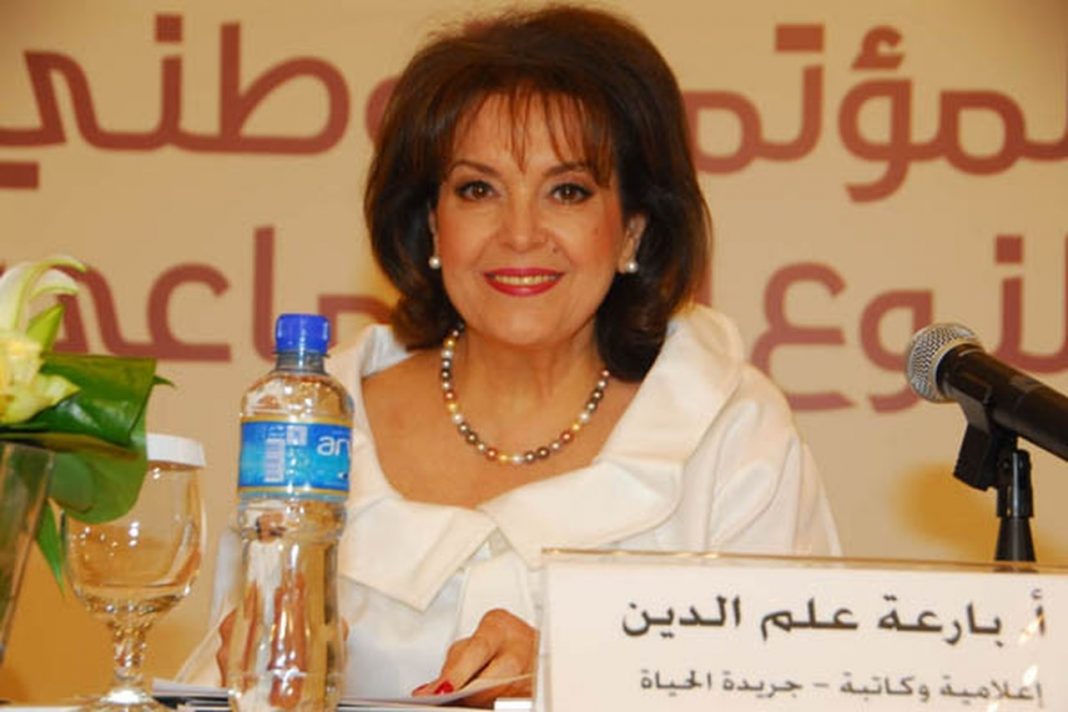What doesn’t kill Lebanon’s revolution only makes it stronger
بارعة علم الدين/كل ما لا يقتل الثورة اللبنانية هو عملياً يقويها
Baria Alamuddin/Arab News/December 22/2019
Lebanese warn that their nation is held hostage by violent and unaccountable paramilitaries — so these same paramilitaries prove these claims true by escalating their attacks on peaceful rallies.
People demand abolishment of the corrupt, sectarian system — so the president stubbornly aims to force through a Cabinet apparently chosen to alienate ordinary Lebanese even more than its predecessors did.
In what some commentators are describing as a “counter-revolution” against the protest movement, Sunni politician Hassan Diab has been nominated as prime minister, having been wined and dined by Gebran Bassil at the presidential palace. Given the expected boycott by the main Sunni, Druze and Christian factions, the resulting Cabinet is likely to be a bizarre mixture of nonentities and Hezbollah acolytes.
After two months of protests, citizens won’t be placated or deceived by such desperate, self-serving maneuvers.
Despite Hezbollah having murdered his father, Saad Hariri justified participation in previous Hezbollah-sponsored governments as the price to be paid for civil peace. Yet peace for its own sake, while Iran-aligned factions bankrupted the nation — financially, politically and morally — ultimately proved worthless.
Lebanon’s economy is in freefall. Over 10 percent of Lebanese companies went out of business in 2019, a further 22 percent cut staff by over 60 percent, and the collapse of several major corporations is just around the corner. Those lucky enough to retain their jobs have had their salaries slashed.
This is precisely why protesters must not back down now. If they return meekly to their homes, this painful process will simply reignite in the future — over and over again. Protests are about forcing the state to embark on emergency surgery, cutting away decades of accumulated cancerous tissue to save the patient’s life. If Lebanon is simply put to bed with an aspirin and a warm drink, the only possible prognosis is a slow and painful death.
Lebanon’s entrenched political class in its entirety (“kilon yanni kilon,” or “all of them means all of them,” as the protesters chant) has bled Lebanon white.
In one decade it plunged from 63rd to 143rd place on the global Corruption Perceptions Index, and is thus among the most corrupt kleptocracies on the planet.
One percent of the population hoards an estimated 25 percent of the nation’s wealth, forcing penniless citizens to shoulder a debt-to-GDP ratio of 150 percent, rendering debt-servicing an intolerable burden.
Bassil and Hezbollah leader Hassan Nasrallah blame protesters for damaging the economy, but the protests were the straw that broke the camel’s back after their criminal enterprises left the coffers empty. Even before the demonstrations, GDP growth averaged 0-0.3 percent and in recent weeks the currency has lost 30 percent of its value.
Despite Hezbollah having murdered his father, Saad Hariri justified participation in previous Hezbollah-sponsored governments as the price to be paid for civil peace.
The economy has been cannibalized by entities hostile to Lebanon’s existence. The smuggling to Syria of over $1.7 billion in hard currency, and the exploitation of Lebanon’s financial networks to launder funds for Tehran, have crippled the banking system.
International sanctions resulting from these abuses, and the reluctance of Gulf investors to risk their wealth in this morass of criminality, have worsened the plight of this erstwhile regional banking hub.
Lebanon’s modest population during peak tourist seasons is habitually dwarfed by the influx of millions of Khaleejis, Westerners, and Lebanon’s own vast diaspora. Yet how can tourism flourish when Beirut’s streets are teeming with theocratic militants noisily jostling for war with Israel?
Panicking hotel owners report a collapse in occupancy from approaching 100 percent to below 10 percent. Everything inherently precious has been trampled underfoot by the thugs and terrorists who have labored to turn Lebanon into a pariah state.
A veteran Western diplomat commented to me that one of the best hopes for Lebanon emerging from the current stand-off was if France and its allies assertively intervened. Yet he feared that such multilateral diplomatic action via the EU and UN would be forthcoming only if there were widespread bloodletting perpetrated by Hezbollah against Christian and minority communities.
The endgame may be some distance away, but in Iraq, Syria and Lebanon, Iran’s hegemonic project can end only in failure. Recent events have burnt away the last vestiges of support for Tehran’s proxies. In Iraq, Ayatollah Sistani’s call for fresh Iraqi elections (if free and fair) would produce a collapse in support for paramilitary elements who have spent the past two months massacring their own Shiite grassroots constituents. Hezbollah’s Lebanese supporters are either in demoralized denial, or have already begun to re-evaluate their allegiances.
What of Hezbollah’s manufactured outrage over a spurious critical social media post? They went on the rampage in Tripoli, attacked the home of a Sunni cleric, and firebombed a Christmas tree; do they believe such cartoonish gangsterism will endear them to citizens? Of course not. This is Tehran’s “axis of resistance” in its death throes, willing to countenance dragging Lebanon back toward sectarian strife in a final, desperate throw of the dice to cling on to power.
Lebanese genuinely fear a return to civil war, or Hezbollah returning to its favored tactic of political assassinations, particularly following reports that the Quds Force commander Qassim Soleimani threatened to assassinate Iraqi cleric Muqtada Al-Sadr if he continued to back protesters.
However, if people remain steadfastly united, determined and focused on their objectives, they can ultimately defeat these malevolent attempts to terrorize, brutalize and humiliate them; whether through threats, violence or political maneuvering, each new attempt to kill off the revolution has only made protesters more determined. This is merely the darkness before the dawn if citizens succeed in taking that final leap of faith; abolishing the last vestiges of a hated and predatory sectarian system that for too long has created only misery, poverty and national isolation.
• Baria Alamuddin is an award-winning journalist and broadcaster in the Middle East and the UK. She is editor of the Media Services Syndicate and has interviewed numerous heads of state.






















